Robert Strong Woodward, Stanley Wingate Woodward, and a soldier boy.
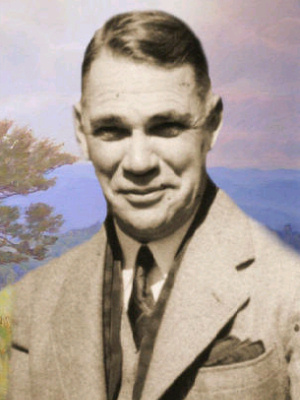
Robert Strong Woodward
Landscape artist
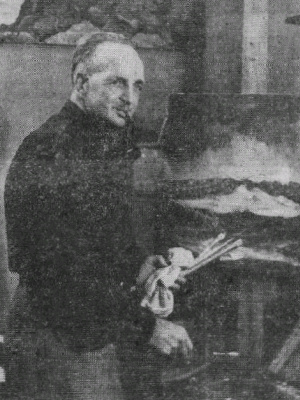
Stanley Wingate Woodward
Seascape artist
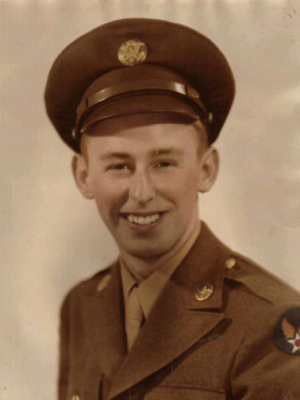
Mark Purinton, 1945 Army Air Corps
a soldier boy
Here beginneth an essay about the memories of a soldier boy and two artists, Robert Strong Woodward and Stanley Wingate Woodward. It will likely have to be sanitized and prissified by my dear proof reader who will find its language unsatisfactory for a website, much against my preference to tell it like it is. But here goes.

There would be a letter from the soldier overseas. These were never as long and never as interesting but told some of the things going on in the war. There were always black strike outs by the censor, because all army overseas mail was censored in those days. After the African campaign, he was sent to England and made air flights over Germany. When these letters stopped coming we all knew what had happened. Eventually the news came confirming that Sgt. Richmond had been lost in action somewhere between England and Germany. Only then did Uncle Rob stop writing to him.
At the end of my high school days I volunteered to enter the Army Air Corp. Many in my senior class volunteered or even were drafted into service and did not complete their senior year and graduate. Because I officially volunteered, I was allowed to finish high school before being called up. As soon as I was given a mail address Uncle Rob, as I had by now come to know him and call him, began daily letters to me about the home town goings-on. At mail call every morning when we were lined up in front of our barracks I could almost always depend on the name Pure-inton being called out by the sergeant and receiving a letter from RSW. It was difficult to write back to him because I could never think of anything worth writing about. But I tried and probably wrote 3 or 4 times a week. This was all toward the end of the war, then the bomb dropped, and the training schools I was assigned to go to were dissolved and for months I spent just marking time waiting to be mustered out. There was no more war to fight.
It was during this time that I met Stanley Woodward. RSW had learned that he and I were stationed at the same army base and he wrote and requested that Stanley meet me, maybe even go out to supper with me some evening. Stanley did contact me and invited me to come to his off-base apartment for supper. This was an uncomfortable meeting, probably for both of us. Stanley was a Captain, or maybe a Colonel, I forget. Anyway, it was against army protocol for an officer to fraternize with an enlisted man. I was given strict instruction by Captain Woodward as to how to get to his apartment off-base, how to come up the back stairway so as not to be seen and told that if I got lost I was not to mention that I was looking for his apartment. But I found it OK and did have supper with him. Actually, I can remember nothing at all that we talked about. I did learn that the army language of officers was identical to that of enlisted men! (That part I have cleaned up and omitted to please my proofreader.) After the meal I gratefully and gleefully went down the back stairway and back to the base glad to have the encounter over. But I do remember then writing RSW and telling him what a nice meal we had had and what a good talk we had had.
Stanley and Robert were both fairly well-known artists. Stanley was known for seascapes and Robert for New England landscapes. After the war they became quite competitive. I relate elsewhere in this website about RSW painting numerous paintings of the Halifax House in West Halifax, Vermont. Several were published in magazines. Then one day a painting of the same house appeared in a magazine painted by Stanley. This was heresy. Sparks flew. Unpleasant letters went back and forth. But it finally quieted down and on several occasions Stanley and his wife came to visit RSW in Buckland and on at least one occasion they traveled up to the Heath Pasture to paint together. I remember one time when RSW traveled in the grand Packard up to Rockport to visit Stanley, but he was not home at the time. We did, however, see the outside of his studio there.
Below find links to pictures of the Halifax House, several by RSW and one by Stanley Woodward. At the end of this essay is reproduced a typical example of a Stanley Woodward seascape.
These were two great artists of the 20th century. Paintings of both are scattered across the country.
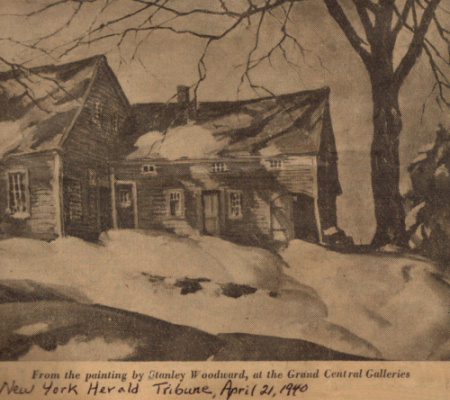
Image of Stanley Wingate Woodward's Halifax House
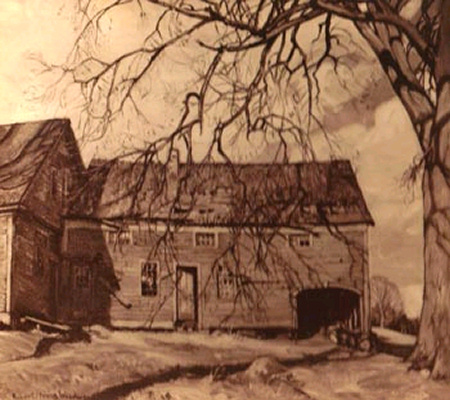
Image of Robert Strong Woodward's Halifax House
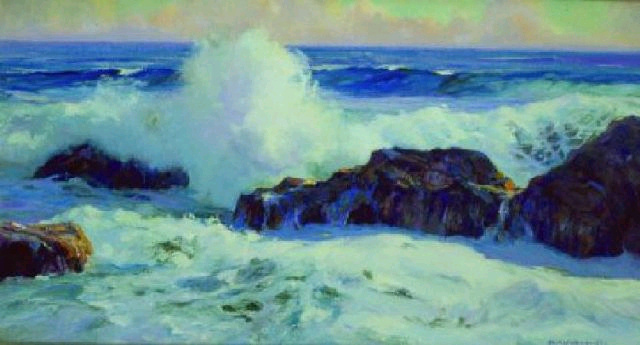
"Crashing surf, late afternoon, Maine" - Typical image of Stanley Woodward Seascape
(This photograph of one of his paintings was given to RSW probably sometime in the 1940s.)
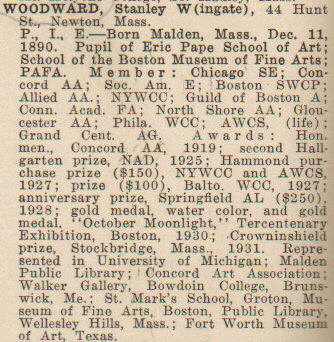
Courtesy of Who's Who in American Art, 1936.
Stanley Woodward was a Cpl. in WW1 1918-1919.
He was commissioned Captain on June 27, 1942
and served until April 15, 1945.during WWII
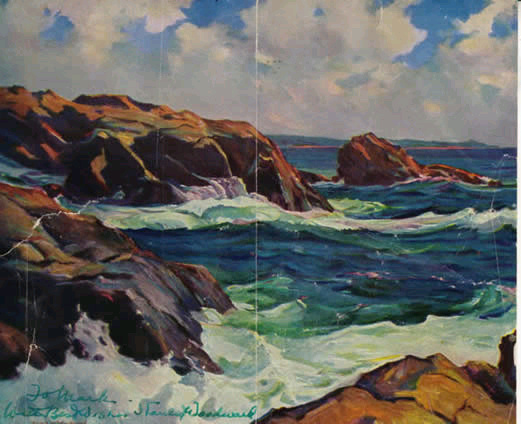
Signed print of "When the Wind Blows West" given to me by Stanley Woodward

Closeup of signature - "To Mark with best wishes Stanley Woodward"
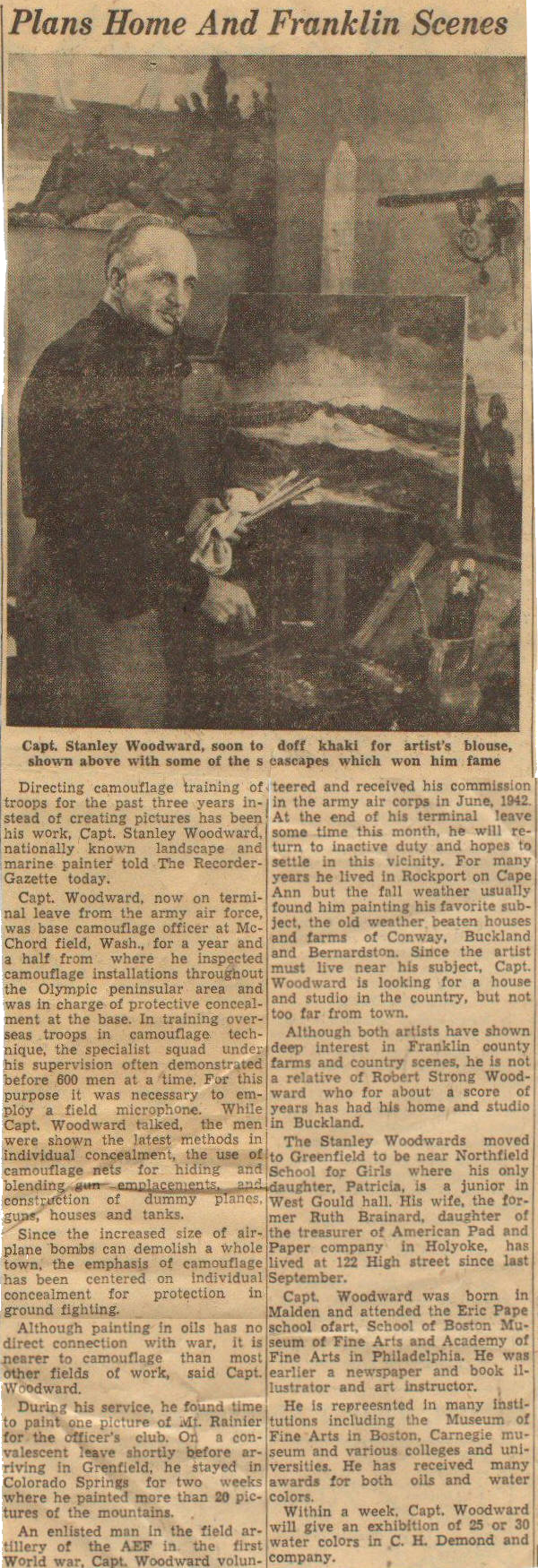
Greenfield Recorder article about Stanley Woodward
MLP
2007

